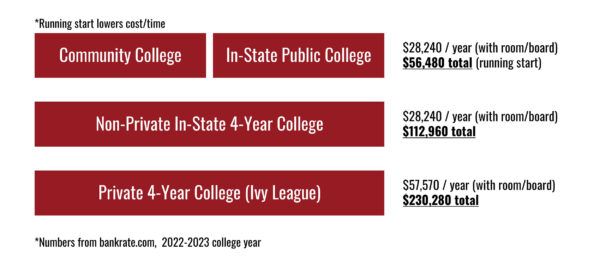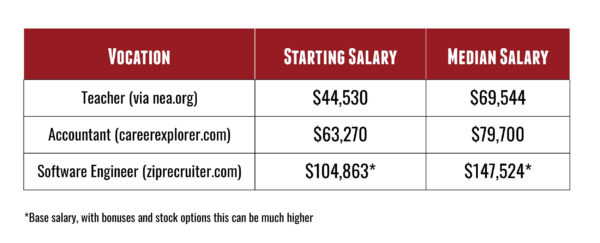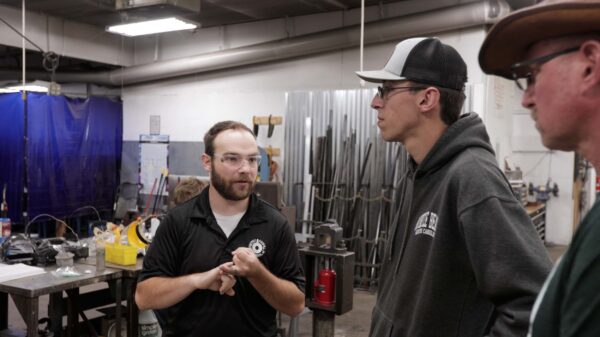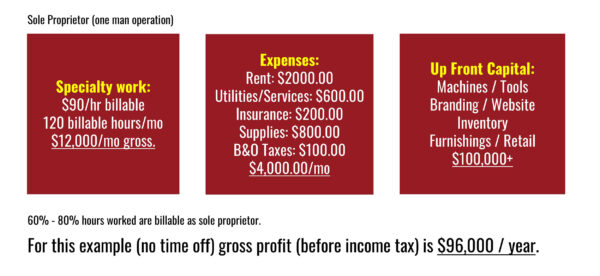The choice between trade school and college is a big one, and there is no right answer for everyone. I took some time to break down the career pathways of each.
Disclaimer
Ultimate Reloader LLC / Making with Metal Disclaimer: (by reading this article and/or watching video content you accept these terms). The content on this website (including videos, articles, ammunition reloading data, technical articles, gunsmithing and other information) is for demonstration purposes only. Do not attempt any of the processes or procedures shown or described on this website. All gunsmithing procedures should be carried out by a qualified and licensed gunsmith at their own risk. Do not attempt to repair or modify any firearms based on information on this website. Ultimate Reloader, LLC and Making With Metal can not be held liable for property or personal damage due to viewers/readers of this website performing activities, procedures, techniques, or practices described in whole or part on this website. By accepting these terms, you agree that you alone are solely responsible for your own safety and property as it pertains to activities, procedures, techniques, or practices described in whole or part on this website.
My Journey
While most know about my career at Microsoft, they don’t realize I had early experience in the trades. My dad taught me to run printing presses while I was in high school. This job had me earning twice as much as my friends working at chain restaurants and other entry-level jobs. As I progressed through high school, I developed a fascination with painting cars. I found a job at a local body shop and worked my way from prepper to painter. I still use some of what I learned painting cars while applying Cerakote.

Now I’m gunsmithing and building custom rifles for customers through Precision Rifle Concepts.

This video is presented by the Colorado School of Trades. They have been a fantastic resource, educating me on both career opportunities and their teaching techniques.

What Makes a Great Career?
There are three things that make a great career:
- Is this your passion?
- Are you good at this?
- Can you make money doing this?
Whatever path you choose, I personally believe the most important thing is to pursue your passion. You need to be excited about what you are doing. It’s also helpful to recognize that every person has certain proclivities and are better at certain things than others.

This isn’t to say that skills can’t be learned with determination, but what comes naturally is generally something you are also interested in. Unfortunately, in order to survive, you need to be able to make money. Not all passions or skills are fantastic career choices and sometimes sacrifices have to be made.
Career Pathways
It’s important to realize that there is no one path to any one career. Some pursue higher education, some go to trade school, and others learn on the job. There exist a myriad of ways to end up in different jobs in different fields. Some come unexpectedly. I attended community college for two years before finishing my mechanical engineering degree at a state school. Taking a very simplistic view, there are two traditional career pathways: college and trade school.

Attending college typically leads to an office job and a potential opportunity to work your way up in a company. Sometimes, those with an entrepreneurial spirit decide to start their own business. Trade school graduates have a similar path, from school to a job, to some sort of supervisory role. This includes running a store, being a lead, or starting a business. Being an entrepreneur in a skilled trade can be incredibly lucrative if you are good at business in addition to your trade.
College Path
College costs can add up. Students generally approach higher education in one of three ways: community college + in-state public college, non-private in-state 4-year college, or private 4-year college. Some high schools offer programs that allow students to earn college credits while in high school. These can lower costs and save time. Attending community college for the first two years is another popular option as it provides an opportunity for self-discovery with much lower risk. This chart includes general numbers I found online — everyone’s situation is different and total costs will vary.

I also pulled some median salaries of college graduates. Again, these will vary based on the area, employer, cost of living, etc.

There are pros and cons to any venture. Going to college typically affords an individual a wider breadth of opportunity. Many jobs/careers require a degree and white collar jobs may have more comfortable working environments. A high salary is possible, but not guaranteed. However, the initial cost of college is significant — a four-year time investment and average loan duration of 21 years. College is not a good model or environment for everyone and corporate politics can be burdensome.
Trades Path
Overall, trade school education is typically faster than college with a very focused curriculum. I’m using the Colorado School of Trades as a data point as they have provided current costs and comparing trade schools across specialties is very difficult. Much of the information I found online for other schools is several years old and has not been adjusted for inflation.

Attending the Colorado School of Trades comes with a tuition of $27,000. Tools and supplies bring the cost to $32,150, plus living expenses. The program runs 14 months, so it is much shorter than college. Students graduate CST with an associate of occupational studies in gunsmithing, a complete project rifle, and approximately $5,000 in tooling. Here is the 2024 complete tool list students leave CST with.

To summarize, students leave with an associate’s degree, portfolio/heirloom rifle, and the tools they need to start working as a gunsmith. Pay is all over the map, largely dependent on location and cost of living, but I did pull data from a few job listings.

One job in Chandler, Arizona asks for multiple years of experience at $22-26 per hour. A one-bedroom apartment costs approximately $1,500 per month there. In comparison, a similar job in Camp Parks, California pays $39 per hour, but the cost of a one-bedroom apartment is $3,000 per month. It’s important to look past the salary and to your net income.

Primary factors in securing a gunsmithing job include location, experience, motivation, and aptitude/skill. Remember, opportunities are nearly endless. You can progress to a lead gunsmith or own your own business. Either way, if you develop a niche skill set the firearms industry needs, you will be incredibly valuable. Remember, the firearms industry in particular is extremely volatile and subject to significant changes from world events, elections, and the economy. However, it still holds great opportunities.

One of the negatives to attending a trade school is a narrower job market, potentially limited pay, and financial aid challenges. Students do have a much shorter time investment, smaller class sizes, and learn hands-on practical skills.
Owning Your Own Business
Both college and trade school paths can lead to entrepreneurship, a topic I am extremely passionate about. Considering a sole-proprietorship gunsmithing business, here are some sample numbers.

Running a business can have high earning potential with greater flexibility and options, but it is extremely difficult. While it is your vision and your rules, you have to put in the work including up-front costs and a high initial workload. There is a lot of risk involved. Another thing some don’t consider is a successful business is an asset you can sell — think about the difference between renting and buying a home. (Keep this in mind when you name your business!)

According to the Bureau of Labor Statistics, 20% of small businesses fail in the first year. 50% fail in year five while 65% don’t make it to 10 years. Careful planning and hard work can keep you out of these statistics!
Conclusion
Know yourself and your abilities — the decisions are yours to make. Think creative and be scrappy; balance short and long-term tradeoffs. Find a mentor! Learning from someone who is where you want to be is incredibly valuable and can significantly expedite your journey. Don’t forget to follow your passion, whatever industry it may be in, and don’t fear the road less traveled.
If you’re interested in attending the Colorado School of Trades, check out their website!

Don’t miss out on Ultimate Reloader updates, make sure you’re subscribed!
Thanks,
Gavin Gear


































































